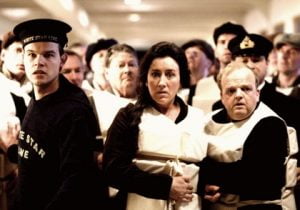Two new international coproductions will mark the 100th anniversary of the sinking of the Titanic next month. Michael Pickard reports.

Titanic
Of course, there won’t be many people tuning into the £11m (US$17.4m) miniseries that don’t know the fate of the ship’s maiden voyage. But to mark the 100th anniversary of the Titanic next month, Fellowes and series creator Nigel Stafford-Clark have given an unorthodox twist to the well-known story.
The show depicts a microcosm of English society in 1912, from the wealthy aristocrats staying in first-class cabins to the lower class families and immigrants seeking a new life in America residing deep within Titanic’s bows.
Each episode focuses on individual families but will feature every character as their stories become intertwined with each other. Viewers will also see the ship begin to sink in every episode as the series builds up to the finale when it will be revealed who survives and who doesn’t.

Titanic
“It seemed to me that one of the most important things would be to start sinking the boat at the end of each episode. Because everybody knows what’s going to happen, you can tell the story going backwards and forwards through time, which hopefully means the audience doesn’t have that feeling of waiting.”
This sentiment is shared by Fellowes, who was approached to write the project as he was scripting the first season of period mega-hit Downton Abbey, which, coincidentally, starts with news of the Titanic sinking. “I knew this was my chance at the Titanic,” says Fellowes, who describes himself as a “Titanorak.”
“The point of these stories, like the disaster movies my generation grew up on, is to see how people behave in a disaster, how they change, the things they would not have said if they didn’t think they were going to die. And to sit through three hours of people being unhappily married and then at last the ship goes down didn’t seem as tempting. This [non-linear storytelling] solved that for me.”
Fellowes’ Titanic is coproduced by ITV Studios, Lookout Point and Stafford-Clark’s Deep Indigo Productions in the UK; Shaw Media and Sienna Films in Canada; and Mid Atlantic Films in Hungary. UK commercial broadcaster ITV1 will begin airing the miniseries on March 25, while distributor ITV Studios Global Entertainment has already completed pre-sales to 86 countries worldwide.
Lookout chief executive Simon Vaughan traveled around the world to sell the project to international broadcasters to raise the budget, with Fellowes and Titanic proving to be a popular combination. Among those who have picked up the series are Germany’s ZDF and US network ABC, deals that Stafford-Clark says were pivotal to helping to raise the budget and bring more broadcasters onboard.
“No-one believed we were going to get this off the ground,” he says. “We’re used to a world where big broadcasters would sign the cheque and you’d get some of it back from a coproduction. That’s all changed. We are now in a world where broadcasters are taking a licence for not even half the budget. It’s an anchor fee and then you have to get everything else you need.”
Producers in Europe have a history of building production budgets in this way, akin to financing a feature film. Stafford-Clark, who comes from a film background, believes any high-end drama from now on is going to be financed in this way.
“The glorious days where one broadcaster writes the cheque, that’s gone forever,” he says. “I left feature films because I couldn’t bear the process of putting all the different bits of finance together over three years and then having one fall out at the last minute and not being able to make the movie. I now find myself back in exactly that situation with television.”
Meanwhile, Italian prodco De Angelis Group is behind Titanic: Blood & Steel (12×60’), which is coproduced with Epos Films (Ireland), Artists Studio (UK), Italian public broadcaster Rai TV, Spanish net Antena 3 and French prodco Marathon Media. Germany’s Tandem Communications is distributing the series.
The US$28m series also tells the story of Titanic but instead of recreating the voyage, Blood & Steel focuses on the construction of the ship, its owner and the workers, set in the Belfast shipyards in 1907.
Boasting an all-star cast including Sir Derek Jacobi, Neve Campbell and Chris Noth, the production will stand apart from Fellowes’ recreation in storyline, if not subject. It is the first project to come out of De Angelis’ specialist coproduction unit De Angelis Media, which will concentrate developing series, movies and specials for the international market with a range of global partners.
“No European countries can afford high-budget drama on its own. There will be a still a few productions that are just for domestic market but the majority of the budget will be spent on international coproductions,” De Angelis MD Andrea Zoso tells C21.
While these two Titanic dramas will send viewers back in time, the way they have both been produced and financed represents the future of big budget dramas.